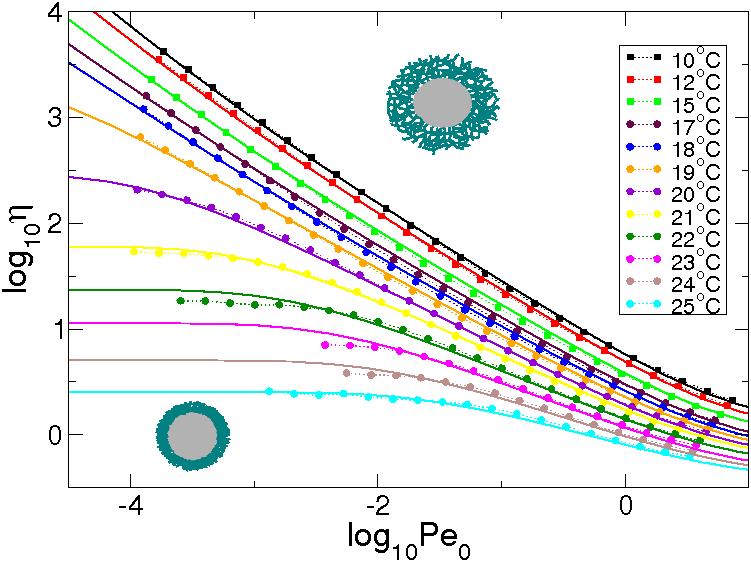Nonlinear rheology of colloidal dispersions

A single Brownian particle performing random motion was the starting point for the understanding of stochastic processes in Statistical Physics, initiated by Einstein, Perrin and others. Equilibrium properties of Brownian particles were largely understood in the second half of last century. Lately, research interest has moved to ‘Colloids in External Fields’ to gain a fundamental understanding of many body systems far from thermal equilibrium. Strong drivings, for example a solvent shear flow, violate ‘detailed balance’ leading to stationary distribution functions which are not of Boltzmann-Gibbs type, and where the classical equilibrium fluctuation dissipation theorems do not hold. The corresponding flow behaviour of dense dispersions under stationary shearing, exhibits the technologically very important effect of ‘shear thinning’. The figure shows the viscosity of novel core-shell particles from the Ballauff group in Bayreuth, whose size varies with temperature. Varying the shear rate, viz. the magnitude of the velocity gradient measured by the Peclet number Pe0, a decrease of the solution viscosity by orders in magnitude can be observed. It is connected to the non-equilibrium transition between a yielding solid and a viscous fluid, situated at ca. 18°C in this sample, and is crucial for the application of a wide class of complex fluids like dispersion paints or tooth paste.
Seyboldt, R., D. Merger, F. Coupette, M. Siebenbuerger, M. Ballauff, M. Wilhelm and M. Fuchs. Divergence of the third harmonic stress response to oscillatory strain approaching the glass transition. Soft Matter, 12, 8825–8832 (2016)
Ballauff, M., J. M. Brader, S.U. Egelhaaf, M. Fuchs, J. Horbach, N. Koumakis, M. Krüger, M. Laurati, K. J. Mutch, G. Petekidis, M. Siebenbürger, Th. Voigtmann and J. Zausch. Residual Stresses in Glasses. Phys. Rev.Lett., 110, 215701 (2013)
Brader, J.M., M.E. Cates and M. Fuchs. First-Principles Constitutive Equation for Suspension Rheology. Phys.Rev.E, 86, 021403
Fuchs, M. and M.E. Cates. Theory of Nonlinear Rheology and Yielding of Dense Colloidal Suspensions. Physical Review Letters, 89, 248304 (2002)
